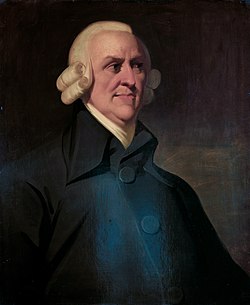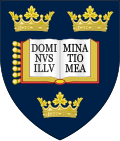Department of Economics, University of Oxford Last updated October 24, 2025 Department of Oxford University
Department of Economics Established 1999; years ago (1999 ) Head of Department Johannes Abeler Academic staff
50 Location Website economics
The Department of Economics is an academic department of the University of Oxford within the Social Sciences Division . Relatively recently founded in 1999, the department is located in the Norman Foster -designed Manor Road Building. [ 1]
History of Economics in Oxford Adam Smith pursued graduate studies at Balliol College in 1740. Despite the department's relatively recent establishment, Oxford has a long history within Economics.
The 19th century saw an expansion of economics within Oxford, with political economy being offered as an option to Greats students, and the Drummond Chair in Political Economy being established in 1825 at All Souls College , first being held by Nassau William Senior . Other notable 19th century Oxford economists include Arnold Toynbee , Francis Ysidro Edgeworth . [ 3] [ 4]
The 20th century saw the first economics programme, a postgraduate Diploma in Economics , in 1904. Economics was later introduced as part of a degree programme as part of the “modern greats” course in 1920, later Philosophy, Politics and Economics . Economist L.L. Price argued that this emphasised Oxford's stance of treating economics “pretty.. but unimportant” . [ 3] [ 4] [ 5] 20th century Oxford economists include Sir Roy Harrod , Jacob Marschak , [ 6] Nicholas Stern , [ 7] Sir David Hendry , [ 8] Stephen Nickell , [ 9] David Soskice , [ 10] Tim Harford , [ 11] and Mark Carney . [ 12]
Courses The department offers three undergraduate courses in economics, but notably no straight economics option: [ 23]
At graduate level, the department offers six courses: [ 24]
MSc Economics for Development, jointly offered by the Department of International Development MSc Financial Economics, jointly offered by the Saïd Business School MSc Economic and Social History, jointly offered by the Faculty of History MPhil in Economics and Social History, jointly offered by the Faculty of History MPhil Economics DPhil Economics Research In the 2014 Research Excellence Framework (REF2014), the Department received an overall grade-point average of 3.44 (out of 4) - the third highest of any department in Economics and Econometrics in the UK, behind UCL and the London School of Economics . [ 25]
Research groups and centres The department currently houses nine research groups, and is involved with five different research centres:
Research groups:
Research centres:
References ↑ "Designed by world class architect Sir Norman Foster – lit by Zumtobel Lighting the prestigious Manor Road Building, The University of Oxford" . Archetech. 22 November 2019. Retrieved 26 July 2020 . ↑ Dr. Eamonn Butler (7 July 2019). "On this day in 1740..." Adam Smith Institute. Retrieved 26 July 2020 . 1 2 "About" . Department of Economics, University of Oxford. Retrieved 26 July 2020 . 1 2 Young, Warren; Lee, Frederic S. (19 February 1993). Oxford Economics And Oxford Economists ISBN 978-0333513620 ↑ Chester, Sir Norman (1986). Economics, Politics and Social Studies in Oxford, 1900–85 ISBN 978-1-349-08546-0 ↑ George Goodman Jr. (28 July 1977). "Jacob Marschak, A Key Developer Of Economics Theory, Dies at 79" . The New York Times . Retrieved 26 July 2020 . ↑ "Nicholas Stern: Chair" . LSE Grantham Research Institute. Retrieved 26 July 2020 . 1 2 "Academic Profile: David Hendry" . Nuffield College, Oxford. Retrieved 26 July 2020 . ↑ "Stephen J. Nickell" . IZA Institute of Labour Economics. Retrieved 26 July 2020 . ↑ "Professor David Soskice" . London School of Economics. Retrieved 26 July 2020 . ↑ "Best-selling economist, Tim Harford (Brasenose College, 1992)" . University of Oxford: Oxford Alumni. Retrieved 26 July 2020 . ↑ Heather Stewart (13 June 2013). "Mark Carney: Bank governor's journey from wilderness to heart of the City" . The Guardian . Retrieved 26 July 2020 . ↑ "Award winners" . University of Oxford. Retrieved 26 July 2020 . ↑ "John R. Hicks: Biographical" . Nobel Prize organisation. Retrieved 26 July 2020 . ↑ "Remarkable Alumni" . Balliol College, Oxford. Retrieved 26 July 2020 . ↑ Dr William Peterson. "James Meade (1907-1995)" . Christ’s College, Cambridge. Retrieved 26 July 2020 . ↑ Glenn Rifkin (21 October 2013). "Lawrence R. Klein, Economic Theorist, Dies at 93" . The New York Times . Retrieved 26 July 2020 . ↑ Sichel, Werner (1 January 1989). The State of Economic Science: Views of Six Nobel Laureates ISBN 9780880995962 ↑ John Kay (31 August 2018). "James Mirrlees, economist, 1936-2018" . The Financial Times. Retrieved 26 July 2020 . ↑ "Amartya Sen: Facts" . Nobel Prize organisation. Retrieved 26 July 2020 . ↑ "A. Michael Spence" . NYU Stern School of Business. Archived from the original on 29 October 2021. Retrieved 26 July 2020 . ↑ "Joseph E. Stiglitz" . Center for Global Development. Retrieved 26 July 2020 . ↑ "The Courses: Undergraduate" . Oxford Department of Economics. Retrieved 26 July 2020 . ↑ "The Courses: Graduate" . Oxford Department of Economics. Retrieved 26 July 2020 . ↑ "REF2014: Institutions ranked by subject" (PDF) . Times Higher Education. 17 December 2014. ↑ "The Complete University Guide 2021" . Mayfield University Consultants. Retrieved 26 July 2020 . ↑ "Tilburg University Economics Ranking 2015-19" . Tilberg University. Retrieved 26 July 2020 . ↑ "ShanghaiRanking's Global Ranking of Academic Subjects 2020 - Economics" . Shanghai Ranking. Archived from the original on 1 July 2017. Retrieved 26 July 2020 . ↑ "World University Rankings 2020 - Economics & Econometrics" . Times Higher Education. Retrieved 26 July 2020 . ↑ "QS World University Rankings by Subject 2020" . QS Quacquarelli Symonds Limited. Retrieved 26 July 2020 . ↑ "Mark Armstrong" . Oxford Department of Economics. Retrieved 14 April 2021 . ↑ "Vincent Crawford" . Oxford Department of Economics. Retrieved 7 January 2021 . ↑ "Ian Crawford" . IFS. Retrieved 20 July 2020 . ↑ "Featured Speaker: Stefan Dercon" . World Bank. Retrieved 26 July 2020 . ↑ "Martin Ellison" . World Bank. Retrieved 26 July 2020 . ↑ "Beata Javorcik" . European Bank for Reconstruction and Development. Retrieved 26 July 2020 . ↑ "Paul Klemperer" . VoxEU. Retrieved 26 July 2020 . ↑ "Dr Margaret Meyer" . The British Academy. Retrieved 26 July 2020 . ↑ "Professor Peter Neary" . The British Academy. Retrieved 26 July 2020 . ↑ "Professor Kevin Roberts" . The British Academy. Retrieved 26 July 2020 . ↑ "Rick van der Ploeg" . International Growth Centre. Retrieved 26 July 2020 . ↑ "Tony Venables" . International Growth Centre. Retrieved 26 July 2020 . ↑ "John Stuart Vickers" . MIT Press. Retrieved 26 July 2020 . ↑ "Dr Andrew Graham: Honorary Fellow" . St Edmund Hall, Oxford. Retrieved 26 July 2020 . ↑ "John Muellbauer" . VoxEU. Retrieved 26 July 2020 . ↑ "Prof Frances Stewart: Professor Emeritus of Development Economics" . Oxford Department of International Development. Retrieved 26 July 2020 . ↑ "David Vines" . The Sydney Institute. Retrieved 26 July 2020 . ↑ "H. Peyton Young" (PDF) . Johns Hopkins University. Retrieved 26 July 2020 . External links
International National Other
This page is based on this
Wikipedia article Text is available under the
CC BY-SA 4.0 license; additional terms may apply.
Images, videos and audio are available under their respective licenses.




